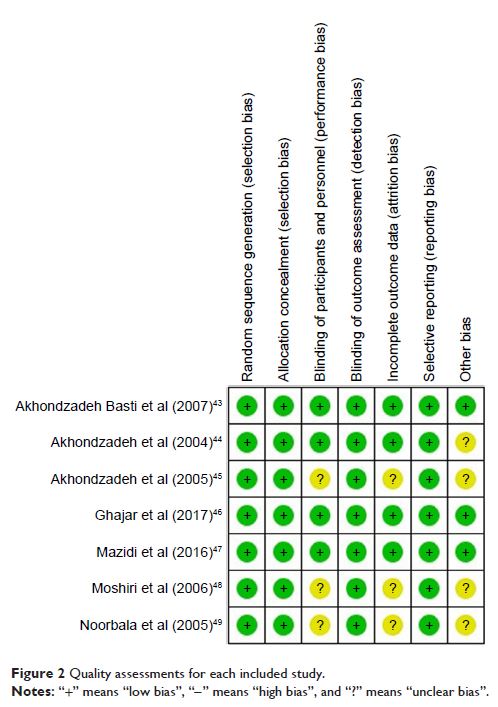108384
论文已发表
注册即可获取德孚的最新动态
IF 收录期刊
- 3.4 Breast Cancer (Dove Med Press)
- 3.2 Clin Epidemiol
- 2.6 Cancer Manag Res
- 2.9 Infect Drug Resist
- 3.7 Clin Interv Aging
- 5.1 Drug Des Dev Ther
- 3.1 Int J Chronic Obstr
- 6.6 Int J Nanomed
- 2.6 Int J Women's Health
- 2.9 Neuropsych Dis Treat
- 2.8 OncoTargets Ther
- 2.0 Patient Prefer Adher
- 2.2 Ther Clin Risk Manag
- 2.5 J Pain Res
- 3.0 Diabet Metab Synd Ob
- 3.2 Psychol Res Behav Ma
- 3.4 Nat Sci Sleep
- 1.8 Pharmgenomics Pers Med
- 2.0 Risk Manag Healthc Policy
- 4.1 J Inflamm Res
- 2.0 Int J Gen Med
- 3.4 J Hepatocell Carcinoma
- 3.0 J Asthma Allergy
- 2.2 Clin Cosmet Investig Dermatol
- 2.4 J Multidiscip Healthc

番红花治疗成人轻、中度抑郁症的疗效和安全性比较:对随机对照试验的一项综合分析
Authors Yang XY, Chen XL, Fu YX, Luo QH, Du L, Qiu HT, Qiu T, Zhang L, Meng HQ
Received 20 November 2017
Accepted for publication 13 February 2018
Published 21 May 2018 Volume 2018:14 Pages 1297—1305
DOI https://doi.org/10.2147/NDT.S157550
Checked for plagiarism Yes
Review by Single-blind
Peer reviewers approved by Prof. Dr. Roumen Kirov
Peer reviewer comments 3
Editor who approved publication: Professor Wai Kwong Tang
Purpose: To investigate the efficacy and safety of saffron in the treatment of
major depressive disorder (MDD) in comparison to placebo and synthetic
antidepressants.
Patients and
methods: We conducted a systematic
search in several electronic databases as well as manual search in
bibliographies of relevant studies. We included randomized controlled trials
that investigated the efficacy and safety of saffron for treating MDD in adults
in comparison to either placebo or synthetic antidepressants. Primary outcome
was change in scores on depressive symptoms from baseline. Secondary outcomes
included remission rate, response rate, and drop-out rate for all reasons. We
chose a random-effects model in order to obtain more conservative results.
Standardized mean differences (SMDs) and odds ratios (ORs) with 95% confidence
intervals (CIs) were estimated as the overall effect index by inverse variance
models.
Results: Seven studies were included in this meta-analysis. Overall quality
of these included studies was moderate. As for the primary outcome, saffron
showed more improvements in depression symptoms when compared with placebo,
with an SMD of -1.22 (95% CI -1.94, -0.49, P =0.001).
Meanwhile, saffron was as effective as synthetic antidepressants, with an SMD
of 0.16 (95% CI -0.25, 0.57, P =0.44). Moderate
heterogeneity existed in our analysis. Through subgroup analyses, we found that
treatment dosage and duration, types of synthetic antidepressants administered
in the comparison group, and outcome measures could explain most of the
variance. No differences were found in remission rate, response rate, or
drop-out rate.
Conclusion: Saffron was effective in the treatment of MDD and had comparable
efficacy to synthetic antidepressants. Saffron was also a safe drug without
serious adverse events reported.
Keywords: saffron, depression, efficacy, safety, meta-analysis
